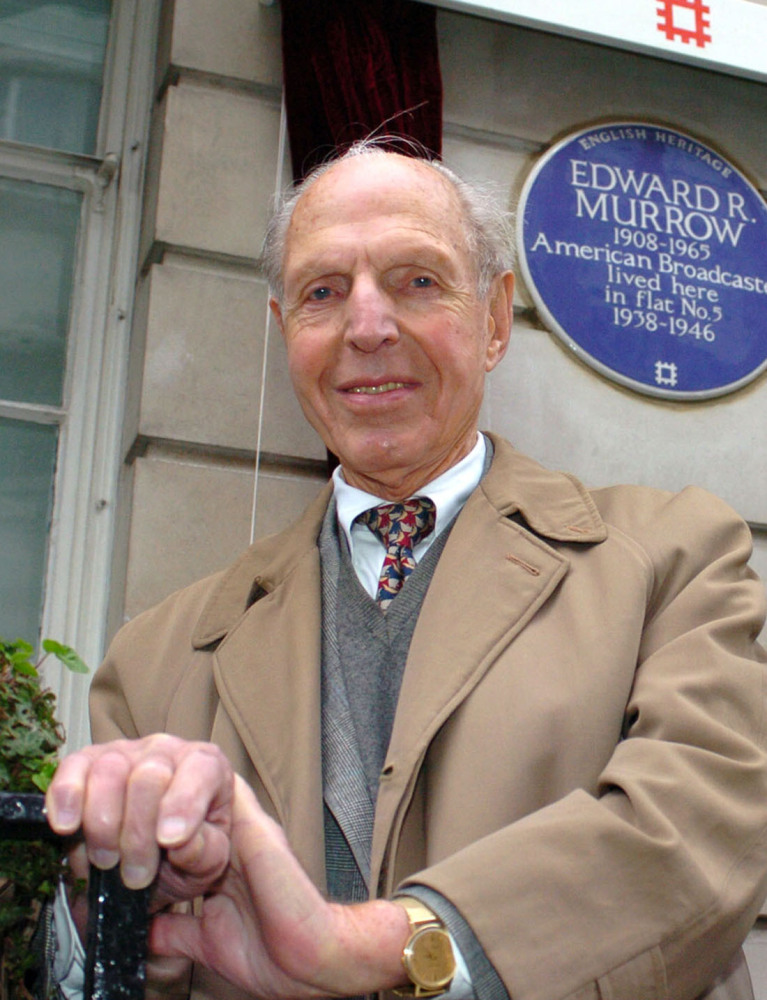Richard C. Hottelet, the longtime U.N. correspondent for CBS News who provided memorable eyewitness accounts of the Normandy invasion and the Battle of the Bulge during World War II and was among the last surviving reporters mentored by the celebrated newsman Edward R. Murrow, died Dec. 17 at his home in Wilton, Connecticut. He was 97.
His granddaughter Maria Hottelet Foley confirmed his death.
Hottelet was part of the team of London-based war correspondents known as “Murrow’s Boys” for their close association with the European news director of CBS News.
Considered one of the finest news teams ever assembled, the group included Eric Sevareid, William L. Shirer, Howard K. Smith, Winston Burdett, Charles Collingwood and Larry LeSueur. They were credited with inventing broadcast journalism – providing vividly reported news accounts of world events. In earlier years, radio news largely was left to commentators such as Lowell Thomas.
Hottelet was an accidental journalist, the American-born son of German immigrants who returned to his parents’ native land just before the start of World War II.
IRRITANT TO NAZIS
He was studying in Berlin when he joined the old United Press wire service to earn pocket money, but his resourcefulness and the deepening world crisis transformed Hottelet into one of the more prominent journalists reporting from Germany at the time.
He was a consistent irritant to the Nazis and courted arrest several times while reporting on the deportation of Jews, Stanley Cloud and Lynne Olson wrote in their book “The Murrow Boys.”
After a bomb went off in 1940 at a Nazi party beer hall assembly in Munich, Hottelet phoned the meeting place in what Cloud and Olson called his “most arrogant oberführer’s voice”:
“This is Berlin! What … is … happening there?”
The man on the other end told him the details he needed, until Hottelet aroused too much suspicion with his questions and was told to “get lost.”
With his Gestapo file growing, he was arrested in March 1941 on espionage charges and spent four months in solitary confinement while being interrogated harshly at a series of prisons. He and another American were released in exchange for two Germans detained as spies in the United States.
Hottelet was hired by Murrow in time to cover the Normandy invasion of June 6, 1944. Hottelet boarded a bomber that attacked Utah Beach six minutes before the Allied operation commenced and later was with American troops during the Battle of the Bulge.
“It’s icy cold on the front tonight, and the muck on the roads and in the fields is frozen hard in wrinkles and folds,” he said in one broadcast. “And the tire marks of trucks and jeeps and tanks that have been rolling forward have now hardened into regular corrugated patterns. The men digging new positions in the field have had to chop at the ground with their shovels and use axes. Out in the forward position, men are lying in holes beating their hands together, stamping their feet to get warm.”
Later, he parachuted to safety when his plane was hit with flak while covering the airborne crossing of the Rhine. After the war, Hottelet broadcast from Moscow and Bonn and briefly hosted an early-morning TV newscast.
His tendency toward descriptiveness did not make him an ideal television personality, but his knowledge of world affairs and his unflappability under pressure was helpful in covering major developments in politics and diplomacy. He served as CBS’s United Nations correspondent from 1960 until retiring from the network in 1985.
Richard Curt Hottelet was born Sept. 22, 1917, in New York. After his father lost his import-export business during the Depression, the family was forced into a series of increasingly humble dwellings. “Dick” Hottelet graduated from Brooklyn College in 1937 and moved to Germany at his father’s urging to live with cousins who were financially better off.
LIKE A ‘STERN PROFESSOR’
In 1942, he married Ann Delafield, who had been an employee of the British embassy in Berlin. She died in 2013. The Hottelets were predeceased by their children, Antonia Guzman and Richard Peter Hottelet. Survivors include four grandchildren and two great-grandchildren.
Marvin Kalb, founding director of Harvard University’s Joan Shorenstein Center on the Press, Politics and Public Policy and a former reporter for CBS and NBC News, said Hottelet was an “extraordinary reliable” reporter who gave a memorable sense of urgency to his broadcasts, to the extent that he sometimes sounded like a “stern professor.”
Indeed, since 2006, Hottelet had been a James Clark Welling Presidential Fellow at George Washington University, where he lectured on the evolving nature of journalism and war. Compared with what he called the “unpredictable insanity” of the modern war against terrorism, World War II and its clearly defined battlefronts and enemies seemed to him an “ancient minuet.”
Copy the Story LinkSend questions/comments to the editors.



Success. Please wait for the page to reload. If the page does not reload within 5 seconds, please refresh the page.
Enter your email and password to access comments.
Hi, to comment on stories you must . This profile is in addition to your subscription and website login.
Already have a commenting profile? .
Invalid username/password.
Please check your email to confirm and complete your registration.
Only subscribers are eligible to post comments. Please subscribe or login first for digital access. Here’s why.
Use the form below to reset your password. When you've submitted your account email, we will send an email with a reset code.